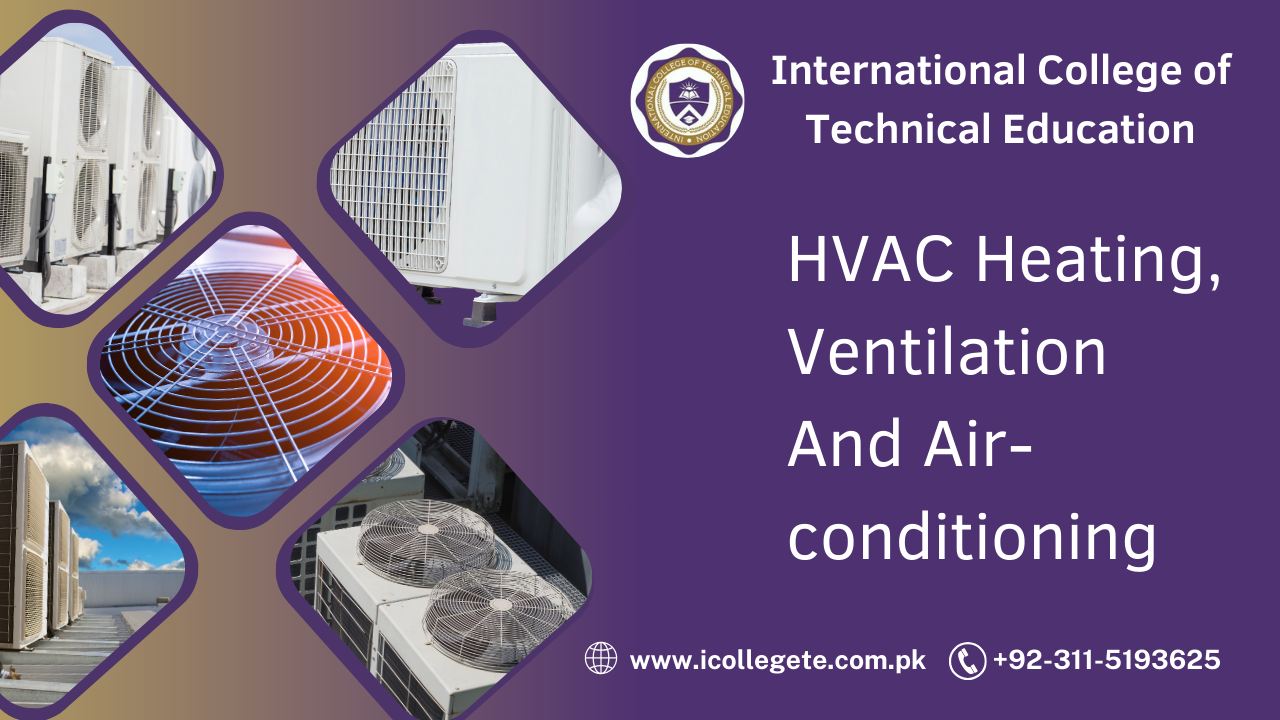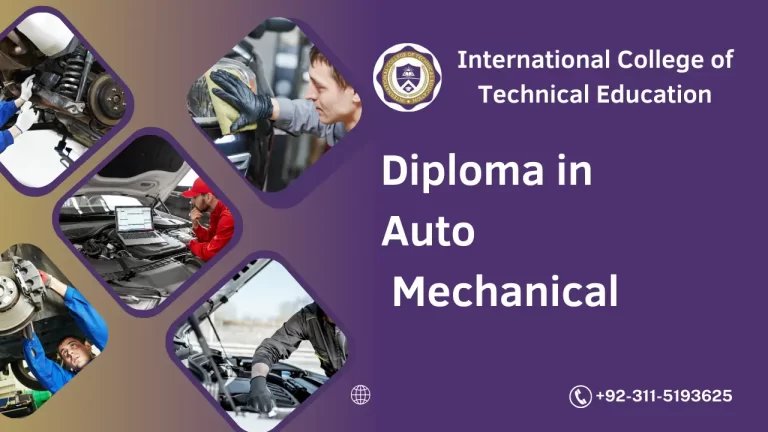As the demand for efficient and reliable climate control systems continues to grow across residential, commercial, and industrial sectors, skilled professionals in the field of HVAC (Heating, Ventilation, and Air-Conditioning) are more sought-after than ever. The HVAC Heating, Ventilation, and Air-Conditioning Course in Chakwal offers an exciting opportunity for individuals to develop the essential skills needed to work with and maintain these complex systems.
The HVAC Heating, Ventilation, and Air-Conditioning Course in Chakwal is a specialized training program aimed at equipping students with comprehensive knowledge of HVAC systems. This includes the installation, maintenance, and repair of heating, ventilation, and air-conditioning units used in residential, commercial, and industrial applications. The course combines theoretical concepts with practical experience to ensure that students are fully prepared to handle the demands of the HVAC industry.
Course Overview
The HVAC Heating, Ventilation, and Air-Conditioning Course provides a thorough introduction to the principles of climate control systems. It covers the technical, mechanical, and electrical aspects of HVAC systems, with an emphasis on modern, energy-efficient technologies. The course is structured to offer both theoretical knowledge and hands-on training, ensuring that students gain practical experience that can be applied directly to the field.
Key topics include the components and functioning of HVAC systems, understanding HVAC schematics, refrigeration cycle, duct design, energy management, and safety protocols. Students will also gain proficiency in troubleshooting, installation, and maintenance procedures for a variety of HVAC units.
Study Units
The course is divided into several modules designed to provide a well-rounded education in HVAC systems. Each unit addresses a key aspect of HVAC technology:
- Introduction to HVAC Systems:
- Basics of heating, ventilation, and air-conditioning.
- Importance of HVAC systems in various industries.
- Understanding the different types of HVAC systems, including central, split, and packaged units.
- Principles of Heating Systems:
- Working principles of heating systems, including furnaces and heat pumps.
- Types of heating sources: electric, gas, and oil-based.
- Installation, maintenance, and troubleshooting of heating systems.
- Air-Conditioning and Refrigeration:
- The science behind cooling and refrigeration cycles.
- Types of air-conditioning units (window, split, central systems).
- Troubleshooting and repairing common air-conditioning issues.
- Ventilation and Airflow Control:
- Importance of proper ventilation in maintaining indoor air quality.
- Duct design and installation techniques.
- Understanding air filtration systems and their role in energy efficiency.
- Energy Efficiency and Sustainable HVAC Practices:
- Principles of energy-efficient HVAC systems.
- Techniques for reducing energy consumption in HVAC operations.
- Introduction to green technologies and sustainable HVAC solutions.
- HVAC Controls and Automation:
- Understanding thermostats, sensors, and control systems used in HVAC.
- Automation technologies that help improve efficiency.
- Integration of smart home technologies with HVAC systems.
- Maintenance, Troubleshooting, and Repair:
- Routine maintenance tasks to extend the lifespan of HVAC systems.
- Diagnosing and fixing common HVAC issues, such as refrigerant leaks, airflow problems, and electrical faults.
- Using diagnostic tools and equipment for efficient repairs.
- HVAC Safety Standards:
- Safety precautions and protocols when working with HVAC systems.
- Electrical safety and working with high-voltage systems.
- Adhering to local and international HVAC industry standards and regulations.
- Installation and Commissioning of HVAC Systems:
- Best practices for installing HVAC units in residential and commercial spaces.
- Commissioning procedures to ensure HVAC systems are working efficiently.
- Documentation and compliance with local codes and standards.
- HVAC Troubleshooting and Advanced Diagnostics:
- Advanced troubleshooting methods for complex HVAC problems.
- Using specialized tools and diagnostic equipment.
- Understanding fault codes and system diagnostics.
Learning Outcomes
Upon successful completion of the HVAC Heating, Ventilation, and Air-Conditioning Course in Chakwal, students will be able to:
- Understand the basic principles of HVAC systems and their components.
- Install, maintain, and repair heating, ventilation, and air-conditioning units in a variety of environments.
- Troubleshoot common HVAC issues, including airflow problems, refrigerant leaks, and electrical malfunctions.
- Use diagnostic tools and software to ensure the efficient operation of HVAC systems.
- Optimize energy use in HVAC systems and integrate sustainable practices.
- Comply with safety standards and regulations while working with HVAC equipment.
- Design and install duct systems, ensuring proper airflow and energy efficiency.
- Gain proficiency in handling smart HVAC systems and automation technologies.
Course Benefits
The HVAC Heating, Ventilation, and Air-Conditioning Course in Chakwal offers a wide range of benefits for aspiring technicians and industry professionals:
- In-Demand Skills: HVAC technicians are in high demand across various sectors, including construction, building management, and residential services.
- Hands-On Experience: Students gain practical, real-world experience in installing, maintaining, and troubleshooting HVAC systems.
- Career Opportunities: The course opens doors to a variety of job roles, including HVAC technician, system designer, and maintenance supervisor.
- Energy-Efficiency Expertise: Learn how to work with energy-efficient and sustainable HVAC solutions, which are increasingly popular in today’s environmentally conscious market.
- Job Security: With the growing reliance on HVAC systems in both residential and commercial buildings, HVAC professionals enjoy strong job stability and long-term prospects.
- Professional Certification: Upon completing the course, students receive certification that validates their skills and knowledge in the HVAC field.
- Competitive Salary: HVAC professionals are often compensated with attractive salaries, especially those who possess advanced skills in energy-efficient technologies and complex system troubleshooting.
Who Is This Course For?
The HVAC Heating, Ventilation, and Air-Conditioning Course in Chakwal is ideal for:
- Aspiring HVAC Technicians: Individuals looking to start a career in the HVAC industry, whether in residential, commercial, or industrial settings.
- Existing Technicians: Experienced workers in the field of mechanical or electrical services who wish to specialize in HVAC systems.
- Plumbers and Electricians: Professionals looking to broaden their expertise by adding HVAC skills to their existing qualifications.
- Construction Workers: Builders, contractors, or project managers who need to understand HVAC systems in order to oversee installations and projects effectively.
- Business Owners: Entrepreneurs looking to start their own HVAC installation, maintenance, and repair services.
- Students and Graduates: Individuals interested in pursuing a technical career in the growing HVAC field.
Future Progression for This Course
Upon completing the HVAC Heating, Ventilation, and Air-Conditioning Course in Chakwal, students can explore several career paths and further learning opportunities:
- HVAC Technician: Work as a technician specializing in the installation, maintenance, and repair of heating, ventilation, and air-conditioning systems.
- HVAC System Designer: Design and plan the installation of HVAC systems for commercial and residential buildings, ensuring energy efficiency and comfort.
- Energy Consultant: Advise clients on energy-efficient HVAC systems and strategies to reduce energy consumption in buildings.
- Service Manager: Supervise and manage a team of HVAC technicians, overseeing operations and ensuring quality service.
- Entrepreneurship: Start your own HVAC business, providing installation, maintenance, and repair services for homes and businesses.
- HVAC Project Manager: Manage large-scale HVAC projects in construction, ensuring that systems are designed, installed, and maintained according to specifications.
- Specialized Certifications: Pursue further certifications in specialized areas, such as refrigeration, energy management, or advanced HVAC controls.
- Further Education: Continue your education in advanced HVAC technologies, automation, and renewable energy solutions.
The HVAC Heating, Ventilation, and Air-Conditioning Course in Chakwal is an excellent investment for anyone looking to build a rewarding career in the ever-growing HVAC industry. With the increasing reliance on climate control systems, skilled HVAC technicians are in high demand across various sectors. This course provides both the theoretical knowledge and practical experience needed to excel as an HVAC professional. Whether you’re starting a new career, expanding your current skillset, or looking to start your own business, this course is the perfect step towards achieving your professional goals in the HVAC industry.







